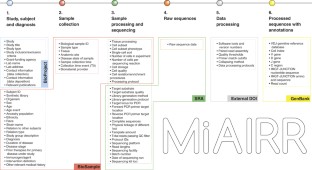
Other ongoing immune repertoire studies in the lab focus on the immune response to HCV infection, Kidney transplant rejection, influenza vaccination, and the development of the healthy immune repertoire. Coeliac disease (CD) is an immune-mediated malabsorption syndrome occurring in genetically susceptible individuals intolerant to dietary gluten. This may help in characterizing the properties of the highly active B cells that drive the progression of celiac disease. Published: 11 April 2022 Single-cell characterization of leukemic and non-leukemic immune repertoires in CD8 + T-cell large granular lymphocytic leukemia Jani Huuhtanen, Dipabarna Bhattacharya. We discovered new characteristics of the different subpopulations in these patients, and now we study commonalities between the B cell populations of different patients and different time points of the same patient. Biopsies from the guts of these patients along with paired blood samples were collected, in order to study B cell dynamics in these patients. In another ongoing research, we study the immune response in celiac patients throughout the course of a year. We showed that the traffic between the periphery and the brain is an on-going process in multiple sclerosis patients, and not a one-time event as was thought before. Using a new sequencing technology and advanced computational tools, we showed that B cells populating the multiple sclerosis brain mature in the draining cervical lymph nodes. In one recent study we analyze paired tissues of brain and lymph nodes coming from multiple sclerosis patients. These autoimmune diseases can exhibit slightly or significantly skewed IRs and provide novel insights that inform our comprehending of disease pathogenesis and provide potential targets for diagnosis and treatment.īCR Immune repertoire SLE TCR autoimmune diseases.In addition to development of computational methods, we apply our and other advanced computational techniques to biological and clinical data. Based on immune repertoire, flow cytometry, and ELISA analyses, our findings suggest that, compared with healthy adults, COVID-19 survivors experience an impaired and disturbed immune system, with large T cell receptor/B cell receptor (TCR/BCR) clones, decreased diversity, abnormal class-switch recombination (CSR) and somatic hypermutation (SHM). In this review, we summarize updated progress on the mechanisms of the IR and current related studies on four autoimmune diseases, particularly focusing on systemic lupus erythematosus (SLE). In the field of IR, HTS can monitor the immune response status and identify disease-specific immune repertoires. Lymphoid malignancies involve the clonal proliferation of one or more B or T cells. Rapid advancements in high-throughput sequencing (HTS) technology have ushered in a new era of immune studies, revealing novel molecules and pathways that might result in autoimmunity. Immune Repertoire Assays for Hemato-Oncology Research. Funding The study was funded with grants from the Berlin Institute of Health (BIH).

The most common symptoms of COVID-19 are fever, cough, and fatigue. Immune Repertoire Furthermore, immune repertoire sequencing encounter challenges due to the complexity of the development of B and T cells (Jang et al., 2015). Adaptive immune receptor peripheral blood repertoire measures are associated with COVID-19 disease severity. At the same time, bias or abnormalities in the IR also pay a contribution to the pathogenesis of autoimmune diseases. The coronavirus disease 2019 (COVID-19) pandemic, caused by severe acute respiratory syndrome coronavirus 2 (SARS-CoV-2), has become a public health emergency. The goal of this review is to bring attention to the variety of techniques and options available for studying the human immune system directly and indirectly through judicious use of appropriate models, in vitro assays, and in vivo studies to improve the translatable potential of immunology research. The diversity of the immune repertoire (IR) enables the human immune system to distinguish multifarious antigens (Ags) that humans may encounter throughout life.


 0 kommentar(er)
0 kommentar(er)
